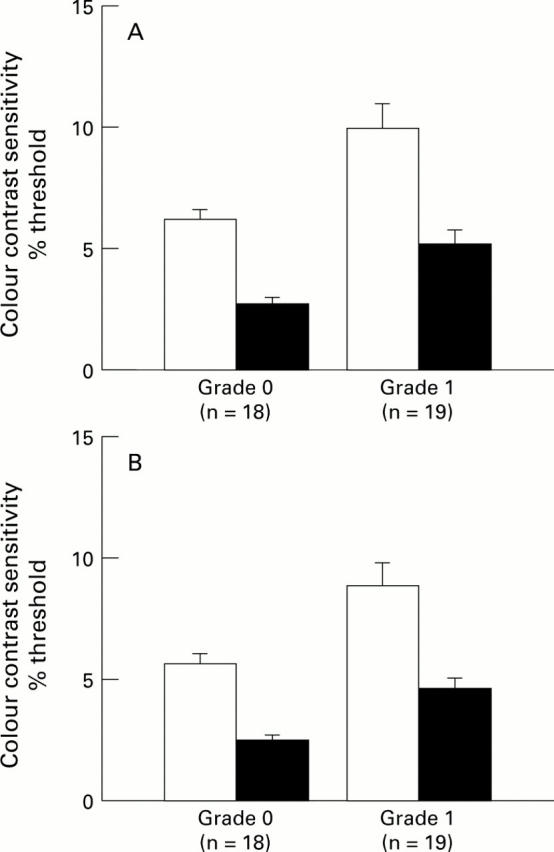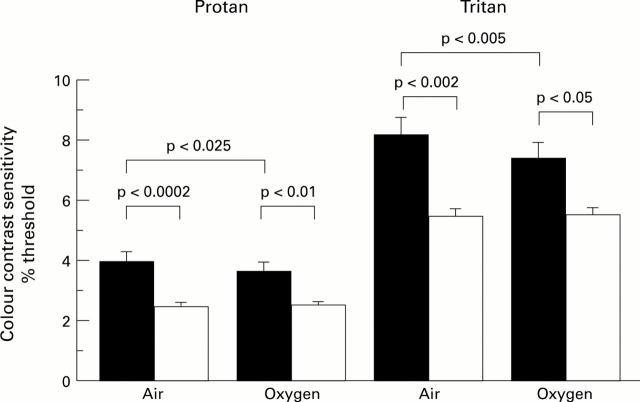Abstract
AIMS—Abnormalities in colour perception occur early in the development of diabetic retinopathy. Whether these changes can be influenced by increasing circulating oxygen saturation was studied in comparison with non-diabetic controls. METHODS—Protan and tritan colour thresholds were measured using a computer graphics system in 37 insulin dependent diabetic subjects, with no or minimal background retinopathy, and 27 matched controls. Colour thresholds were performed after subjects inhaled either gaseous air or 100% oxygen for a minimum of 5 minutes. RESULTS—Diabetic subjects had higher colour vision thresholds when inhaling air when compared with controls (protan (mean 3.93 (SEM 0.39), v 2.36 (0.16), p<0.0002) and tritan (8.15 (0.62) v 5.42 (0.31), p <0.002)). The colour vision thresholds observed in diabetic subjects inhaling air fell when they inhaled oxygen (protan (3.93 (0.39) v 3.57 (0.33), p <0.025) and tritan (8.15 (0.62) v 7.35 (0.59), p<0.005)). No fall in colour thresholds was seen in non-diabetic controls who inhaled oxygen. CONCLUSION—A small improvement in the colour vision thresholds was observed using computer graphics in diabetic subjects, with minimal or no retinopathy, who inhaled oxygen. This study supports a hypothesis that reduced retinal oxygenation contributes to the colour vision defects in diabetes.
Full Text
The Full Text of this article is available as a PDF (88.6 KB).
Figure 1 .
Protan and tritan colour contrast sensitivity percentage thresholds in 37 insulin dependent diabetic subjects (solid bars) and 27 non-diabetic controls ( open bars) when inhaling gaseous air and 100% oxygen.
Figure 2 .

Protan and tritan colour contrast sensitivity percentage thresholds in 37 insulin dependent diabetic subjects according to grade (0 or 1) of diabetic retinopathy when inhaling gaseous air (A) and 100% oxygen (B).
Selected References
These references are in PubMed. This may not be the complete list of references from this article.
- Arden G., Gündüz K., Perry S. Color vision testing with a computer graphics system: preliminary results. Doc Ophthalmol. 1988 Jun;69(2):167–174. doi: 10.1007/BF00153698. [DOI] [PubMed] [Google Scholar]
- Grunwald J. E., Riva C. E., Brucker A. J., Sinclair S. H., Petrig B. L. Altered retinal vascular response to 100% oxygen breathing in diabetes mellitus. Ophthalmology. 1984 Dec;91(12):1447–1452. doi: 10.1016/s0161-6420(84)34124-0. [DOI] [PubMed] [Google Scholar]
- Hardy K. J., Lipton J., Scase M. O., Foster D. H., Scarpello J. H. Detection of colour vision abnormalities in uncomplicated type 1 diabetic patients with angiographically normal retinas. Br J Ophthalmol. 1992 Aug;76(8):461–464. doi: 10.1136/bjo.76.8.461. [DOI] [PMC free article] [PubMed] [Google Scholar]
- Kawagishi T., Nishizawa Y., Emoto M., Konishi T., Maekawa K., Hagiwara S., Okuno Y., Inada H., Isshiki G., Morii H. Impaired retinal artery blood flow in IDDM patients before clinical manifestations of diabetic retinopathy. Diabetes Care. 1995 Dec;18(12):1544–1549. doi: 10.2337/diacare.18.12.1544. [DOI] [PubMed] [Google Scholar]
- Richalet J. P., Rutgers V., Bouchet P., Rymer J. C., Kéromès A., Duval-Arnould G., Rathat C. Diurnal variations of acute mountain sickness, colour vision, and plasma cortisol and ACTH at high altitude. Aviat Space Environ Med. 1989 Feb;60(2):105–111. [PubMed] [Google Scholar]
- Ruddock K. H. The effect of age upon colour vision. I. Response in the receptoral system of the human eye. Vision Res. 1965 Jan;5(1):37–45. doi: 10.1016/0042-6989(65)90073-8. [DOI] [PubMed] [Google Scholar]



